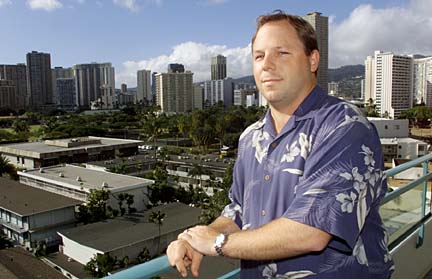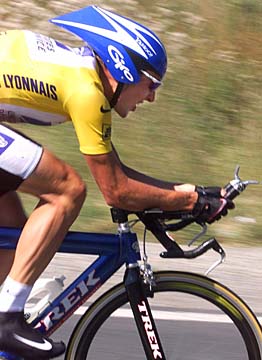


Young couple Matt Delaney's life could not have been better. At 29 he was chief executive officer of Marc Resorts Hawaii, newly married to a high school sweetheart and living on the beach at Lanikai.
battles cancer
Early diagnosis and
courage help defeat
testicular cancerSelf-exams and early identification
By Helen Altonn
are keys to beating the disease
Star-BulletinThen, late last August, he noticed one testicle was bigger than the other. He thought that was strange, but his wife, Karen, a pediatric nurse, said it was not unusual, he said.
He had no pain or symptoms at that time, he said. But on Sept. 30, when he and his wife were at a canoe race on Maui, he said he did not feel right, he had a little pain, and his "entire testicle was rock hard."
His wife told him he had to see a doctor but thought he probably had an infection or inflammation, he said.
He went Oct. 2 to see Dr. George Seberg in Aina Haina, telling him he had allergies and needed an inhaler, that he had a cold sore and back pain.
"Kind of on my way out, I said, 'Oh, by the way, my wife wants you to check me out,' so he did. He said, 'I don't know what this is, but it concerns me. You need to see a specialist.'"
Seberg helped him make an appointment the next day with Dr. Gary Lattimer, a urologist, who knew immediately what was wrong, Delaney said.
He said Lattimer called his wife in and told the couple he had testicular cancer and needed immediate surgery to remove the tumor. Lattimer said they would then figure out whether Delaney needed chemotherapy or radiation and whether he and his wife could have children, Delaney said.
His wife was crying, and he was "trying to hold it in," he said, explaining he is "a very emotional guy. I cry at TV commercials and at every movie.

"We were completely scared about what was going to happen. I'd never been through surgery."Delaney had had a whirlwind business career since being recruited from the University of Southern California at age 19 with accounting and entrepeneurship degrees.
He worked three years for Kenneth Leventhal, a real estate consulting firm based in Newport Beach, Calif., then joined Sunterra Resorts (formerly Signature Resorts) to work on deals and acquisitions, including the Embassy Hotels at Kaanapali, Maui, and Poipu, Kauai. His job was "a dream come true," he said.
He negotiated purchase of Marc Resorts in October 1997 to manage the Embassy properties, acquired some properties in Lake Tahoe and went to Japan for most of 1998 to buy properties.
Delaney and his wife were high school sweethearts who reunited after going to different colleges and again after he returned from Japan. "I don't know how my wife stuck with me," he said. "She's been so supportive. She's so amazing."
His cancer was a shock because he had always been healthy, he said.
He and his wife were advised to get some sperm frozen before the surgery in case they cannot conceive naturally, Delaney said. Of five vials taken, he said, "They think only one might have a slight chance of artificial insemination."
Dr. Lattimer removed his cancerous testicle Oct. 5 on an outpatient basis, and he was back home that night.
He decided to go ahead with radiation five days a week for 15 sessions. "This was a nightmare. I didn't want my whole life to go by. I wanted to get this over with."
He said the radiologist told him, "You've got to be tough; it's mental," and he "went into it like everything I do. 'I'm going to tackle this, and it's not going to phase me.'"
But he spent the first night after radiation throwing up every 10 minutes and having dry heaves, he said. "It was like someone hitting me in the stomach." He tried pills and was still sick. More expensive pills worked, but he was constantly nauseous throughout the radiation period, he said.
"That was the absolute worst. I feel I'm a tough person. I thought I could take it. It wasn't mental; it had nothing to do with being mental. I was completely burning up, everything inside of me."
In his last checkup, however, he said, "I had a clean bill of health. It didn't spread."
On the wall by Delaney's desk is a photo of champion cyclist Lance Armstrong and his infant son. Armstrong revealed in October 1996 that he had testicular cancer and went on to win the 1999 Tour de France.
"I'm not comfortable to read Lance's book yet," Delaney said. "It still hasn't hit me, almost, it happened so quick. I was so scared.
"Other than a couple of occasions, I really haven't broken down and cried. ... I'm not denying that it happened. Maybe it's my personality or strong mind: 'Hey, I fought it, I tackled it. I conquered it.'"
Two days after surgery, the young executive was back at the helm of his 1,000-employee company, with his wife driving him to work and helping him. He should not have gone back so soon, he says now, but he wanted to keep busy.
He did not want to tell everyone at first, but he was limping because of the "hernia incision," he said. "Every time I'd cough or move, it was painful. I finally came out, met with the entire office and told them everything. ... Everybody pitched in and helped out."
He and his wife have moved to Diamond Head. They have taken up paddling. He also plays golf and runs to get in shape. The radiologist suggested the couple wait six months to a year, until his body heals, before they try to conceive a child.
Delaney, now 30, said he and his wife are closer because of his cancer. "I definitely look at things more one day at a time. ... Let's just enjoy everything ... because you never know what can happen.
Young men, who most commonly get testicular cancer, should not avoid going to a doctor because of embarrassment or fear, says a Honolulu urologist. Self-exams and early
identification are keys
to beating the diseaseBy Helen Altonn
Star-Bulletin
Treatment of the cancer "is one of the success stories of modern medicine," says Dr. Gary Lattimer. "Where 20 years ago it was a universally dangerous and potentially fatal problem, now, if picked up early, it's a 92-plus percent cure.
"And the good news is, the risk fades. After (age) 35 it goes down."
Testicular tumors are the most common solid tumors in adult males ages 20 to 35, Lattimer said. Incidence is increasing in the United States and around the world, "and nobody knows why," he said.
Also, for unknown reasons, blacks rarely get testicular cancer, Lattimer said.
Testicles are egg-shape sex glands in the scrotum that secrete male hormones and produce sperm. Testicular tumors are "exquisitely sensitive" to radiation therapy and chemotherapy, so they are highly treatable if caught early, Lattimer said.
Just as with breast cancer, a self-exam is the easiest way to detect testicular cancer, Lattimer said. He said it is not uncommon to have one testicle a little larger than the other, "but we really need to feel the firmness, whether there is a marble or hard lump on it."
In the past, a prosthesis that his family developed -- the Lattimer replacement testicular prosthesis -- was often used, particularly for younger men, Lattimer said. "Certainly, we start seeing it (testicular cancer) at age 15 and 18."
There were never any problems with the device, but it was pulled off the market after problems with breast implants. Also, interest in replacements decreased, Lattimer said.
He noted the "amazing story" of cyclist Lance Armstrong, who has brought a lot of attention to testicular cancer. It had spread through his lungs and brain by the time it was detected. After revealing his cancer in October 1966, Armstrong said he had a size difference in testicles for three years but did not do anything about it until it became so painful he could not sit on his bike.
In Honolulu resident Matt Delaney's case, there are no signs that the cancer has spread, Lattimer said. Delaney was given preventative radiation because the cancer often will return in the lymph nodes along the back, he said.
He said Delaney has the most common type of testicular cancer, seminomas, made up of immature germ cells -- the sperm-forming cells within the testicles. Seminomas are slow-growing and tend to stay localized for long periods in the testicle.
Lattimer said chances of the Delaneys having children are "still quite good."